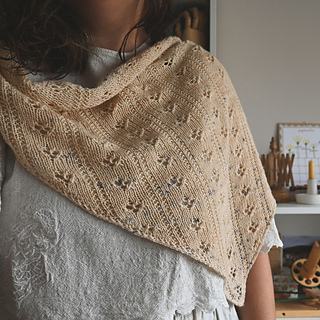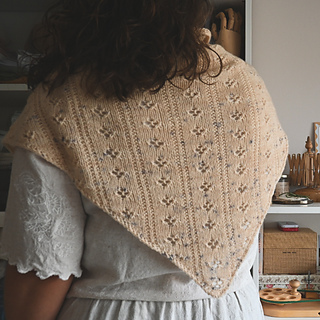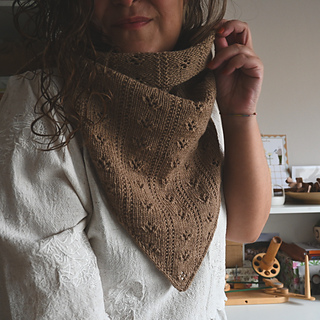patterns >  loareknits' Ravelry Store
loareknits' Ravelry Store
> Arima





Arima
Arima means soul. It’s a design for the second edition of Alma Artesana (Artisan Soul), inspired by romance and timelessness. In collaboration with Mansmaravillas and Yedraknits.
Sizes & Measurements
Sizes: 1 (2) kerchief (shawl)
Width: 70 cm 27 1⁄2”m 43 1⁄4”)
Height: 35 cm 13 3⁄4”m 19 3⁄4”)
Pictured in the size shawl
Yarn
50 (100) g of Yedraknits (75% Organic Merino 25% Biodegradable Nylon; 100 g / 400 m); pictured in the colourway bouquet d’automne
or 50 (100) g of fingering weight yarn
Gauge
20 stitches x 40 rows = 10 x 10 cm 4 x 4′′ in lace pattern, worked flat, after blocking
Needles
3.25 mm US 3 needles (or the required needle size to obtain gauge), 3.75 mm US 5 needles for bind-off
Other notions
bulb-type markers, measuring tape, scissors, darning needle, blocking materials (recommended)
Construction
This is a triangular shawl, starting at the bottom with an i-cord cast-on, increasing at the sides, it is worked flat in a simple lace pattern resembling pointelle. It incorporates double i-cord edges, which are worked at the same time that the shawl is growing (no need to pick up stitches after finishing), and it is finished with an i-cord bind-off. You can choose to knit it full size (shawl), or instructions are provided at the end of the chart repeats to indicate when to stop knitting for a kerchief / shawlette size. With 100 g of fingering weight yarn you can either knit a shawl sized version or two kerchief sized versions.
Techniques
i-cord cast-on, double i-cord edge, knitting and purling, increasing (“make one” increases), decreasing (knit two stitches together, slip, slip knit), yarn over, knitting through the back loop(s). Charted and written instructions are provided.
Acknowledgements
Thank you to the wonderful team of testers who made this pattern possible: luciernaga_9, beateber, Sònia Torner (soniatorner), Kukufrakak, Azulegeoknits & Montse Cataluña
NOTA: Este patrón estará disponible para su venta en los próximos meses. Por ahora, sólo está disponible a través de la caja Alma Artesana 2. Más información en www.mansmaravillas.com
Arima significa alma. Y es el diseño inspirado en la segunda edición de Alma Artesana, romántica y atemporal. En colaboración con Mansmaravillas y Yedraknits.
Tallas y medidas
Tallas: 1 (2) pañoleta (chal)
Ancho: 70 cm 27½”m 43¼”)
Alto: 35 cm 13¾”m 19¾”)
En las fotos en tamaño chal
Hilo
50 (100) g de Yedraknits (75% merino orgánico 25% nylon biodegradable; 100 g / 400 m)
En las fotos en color bouquet d’automne
O 50 (100) g de lana grosor fingering
Tensión
20 puntos x 40 vueltas = 10 x 10 cm 4 x 4″ en el patrón calado, trabajado en plano, después de bloquear
Agujas
Agujas de 3.25 mm US 3a medida necesaria para obtener la muestra de tensión), agujas de 3.75 mm US 5 para el cierre
Otros accesorios
marcapuntos de tipo bombilla o eslabón, cinta métrica, tijeras, aguja lanera, herramientas para bloquear (recomendado)
Construcción
Arima es un chal triangular, que se empieza a tejer por abajo con un montaje en i-cord, y va creciendo hacia arriba según se va aumentando a los lados. Se trabaja en plano en un patrón de calados simple que recuerda al tejido pointelle. Incorpora bordes en i-cord doble, que se van tejiendo a medida que crece el chal (no es necesario levantar puntos al final), y se acaba con un remate en i-cord. Puedes elegir tejer el tamaño grande (chal), o seguir las instrucciones que se dan al final en las repeticiones del gráfico, que indican dónde parar para tejer una pieza tamaño pañoleta. Con 100 g de lana grosor fingering podrás tejer un chal o dos pañoletas.
Técnicas
Montaje en i-cord, borde en doble i-cord, cierre en i-cord, tejer del derecho y del revés, aumentar puntos (hacia la izquierda y hacia la derecha), disminuir puntos (tejer dos puntos juntos, o deslizar, deslizar, tejer), echar hebra, y tejer por la(s) hebra(s) de detrás. Se proporcionan tanto instrucciones escritas como en forma de gráfico.
Agradecimientos
Gracias al maravilloso grupo de testers que hicieron posible este patrón: luciernaga_9, beateber, Sònia Torner (soniatorner), Kukufrakak, Azulegeoknits & Montse Cataluña
- First published: October 2025
- Page created: September 28, 2025
- Last updated: November 23, 2025 …
- visits in the last 24 hours
- visitors right now




